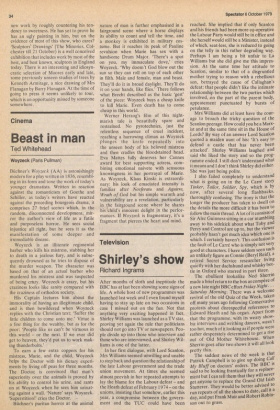Beast in man
Ted Whitehead
Woyzeck (Paris Pullman) Buchner's Woyzeck (AA) is astonishingly modern for a play written in I 836, resembl ing in its form and tone the work of today's younger dramatists. Written in reaction against the romanticism of Goethe and Schiller, as today's writers have reacted against the preceding bourgeois drama, it comprises 27 brief scenes which, in the random, disconnected development, mir ror the author's view of life as a futile and purposeless horror. He sees social injustice all right, but he sees it as the manifestation of some deeper and irremediable disease.
Woyzeck is an illiterate regimental barber who kills his mistress, stabbing her to death in a jealous fury, and is subse quently drowned as he tries to dispose of the murder weapon. The character was based on that of an actual barber who murdered his mistress and was suspected of being crazy. Woyzeck is crazy, but his craziness looks like sanity compared with the craziness of orthodox society.
His Captain lectures him about the immorality of having an illegitimate child, and is then bewildered when Woyzeck replies with the Christian text: 'Suffer the little children to come unto me.' Virtue is a fine thing for the wealthy, but as for the poor: 'people like us can't be virtuous in this world — or the next. If we ever did get to heaven, they'd put us to work making thunderbolts.'
To earn a few extra coppers for his mistress, Marie, and the child, Woyzeck helps the Doctor with his dietary experiments by living off peas for three months. The Doctor is convinced that man's superiority over the animals is proved by his ability to control his urine, and rants on at Woyzeck when he sees him urinating against a wall. 'Nature' says Woyzeck. 'Superstition!' cries the Doctor.
Biichner's puritan horror at the animal nature of man is further emphasised in a fairground scene where a horse displays its ability to count and 'tell the time, and a monkey is exhibited in military costume. But it reaches its peak of Pauline revulsion when Marie has sex with a handsome Drum Major, 'There's a spot on you, my immaculate dove,' cries Woyzeck. 'Why doesn't God blow out the sun so they can roll on top of each other in filth. Male and female, man and beast. They'll do it in broad daylight. They'll do it on your hands, like flies.' There follows what Brecht described as the basic 'gest' of the piece: Woyzeck buys a cheap knife to kill Marie. Even death has to come cheap in this world.
Werner Herzog's film of this nightmarish tale is beautifully spare and restrained. No pyrotechnics, just the relentless sequence of cruel incident, reaching a harrowing climax as Woyzeck plunges the knife repeatedly into the unseen body of his beloved mistress and then cradles the bloodstained head. Eva Mattes fully deserves her Cannes award for best supporting actress, combining emotional naivete with sensuous knowingness in her portrayal of Marie. As Woyzeck, Klaus Kinski is extraordinary: his look of emaciated intensity is familiar after Nosferatu and Aguirre, Wrath of God but his simple warmth and vulnerability are a revelation, particularly in the fairground scene where he shares his 'child's innocent delight in the performances. If Woyzeck is fragmentary, it's a fragment that pierces the heart and mind.










































 Previous page
Previous page